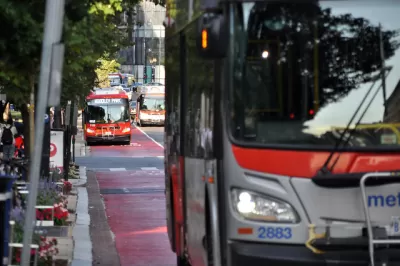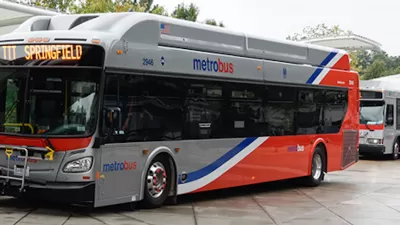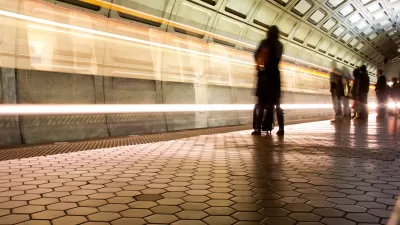Some bus lines will start letting riders board through both front and back doors this fall as part of Metro’s efforts to improve service speed and reliability.

Writing in The Washington Post, Luz Lazo reports on the Washington Metropolitan Area Transit Authority (Metro)’s announcement that, starting in the fall, Metro buses will have all-door boarding to streamline the boarding process and reduce delays.
“The initiative — set to debut in 450 buses, or about a third of the fleet, starting this year — is part of a large-scale effort to improve bus riders’ experience in the capital region,” Lazo explains. As part of the project, the agency is adding new fare collection tech to the front and back doors of buses.
According to the article, “Cities with all-door boarding have seen trip times improve substantially, with savings of up to 30 percent.” Lazo also describes other improvements Metro is making, such as allowing riders to request stops between designated bus stops at night and ticketing drivers who drive or park in bus-only lanes.
As Lazo points out, “The Washington region already experienced rear door boarding in 2020, when Metro closed off front entrances and the first few seats of Metrobuses to protect bus operators from exposure to the coronavirus.” During that time, bus trips were free.
FULL STORY: Metro will roll out all-door bus boarding this fall

Alabama: Trump Terminates Settlements for Black Communities Harmed By Raw Sewage
Trump deemed the landmark civil rights agreement “illegal DEI and environmental justice policy.”

Planetizen Federal Action Tracker
A weekly monitor of how Trump’s orders and actions are impacting planners and planning in America.

The 120 Year Old Tiny Home Villages That Sheltered San Francisco’s Earthquake Refugees
More than a century ago, San Francisco mobilized to house thousands of residents displaced by the 1906 earthquake. Could their strategy offer a model for the present?

In Both Crashes and Crime, Public Transportation is Far Safer than Driving
Contrary to popular assumptions, public transportation has far lower crash and crime rates than automobile travel. For safer communities, improve and encourage transit travel.

Report: Zoning Reforms Should Complement Nashville’s Ambitious Transit Plan
Without reform, restrictive zoning codes will limit the impact of the city’s planned transit expansion and could exclude some of the residents who depend on transit the most.

Judge Orders Release of Frozen IRA, IIJA Funding
The decision is a victory for environmental groups who charged that freezing funds for critical infrastructure and disaster response programs caused “real and irreparable harm” to communities.
Urban Design for Planners 1: Software Tools
This six-course series explores essential urban design concepts using open source software and equips planners with the tools they need to participate fully in the urban design process.
Planning for Universal Design
Learn the tools for implementing Universal Design in planning regulations.
Clanton & Associates, Inc.
Jessamine County Fiscal Court
Institute for Housing and Urban Development Studies (IHS)
City of Grandview
Harvard GSD Executive Education
Toledo-Lucas County Plan Commissions
Salt Lake City
NYU Wagner Graduate School of Public Service





























